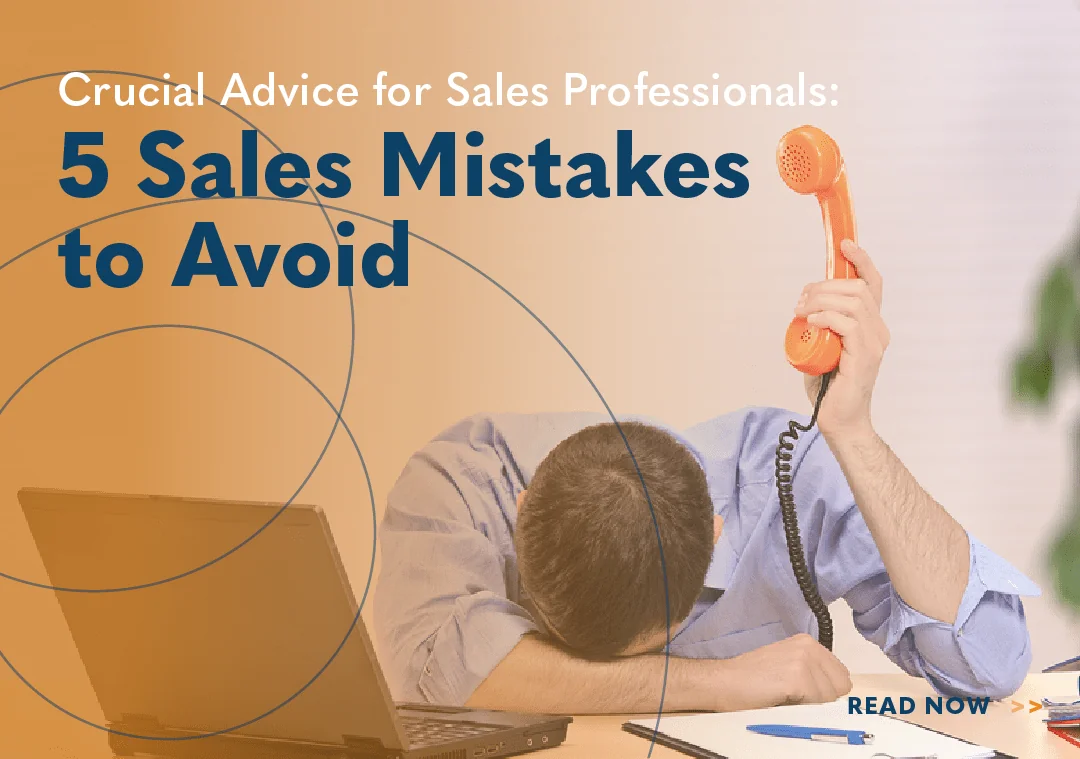Crucial Advice for Sales Professionals: 5 Sales Mistakes to Avoid

All sellers have their tried-and-true practices. These are the things they know work best for them in each sales situation. Maybe, it’s that joke about sales reps and online dating. Or that popular story about nailing the ace and gaining the sale.
Unfortunately, many sales reps also make their share of missteps. Worse, many have no idea they’re making them. If our successes take on a life of their own, mistakes are often hidden. This can be deliberate, i.e., we purposely ignore them. Or it can be subconscious, and we simply don’t see it. Either way, without confronting and correcting the behaviors, they will appear over and over. Here are five common mistakes sellers make and how to avoid them:
Inadequate Preparation
You might think inadequate preparation only applies to inexperienced reps. In fact, if you saw that headline and thought to move on, you proved my point. Don’t feel bad. This isn’t a “gotcha” moment. Instead, it highlights how easy this is to miss.
The truth is even experienced reps fail to plan. Perhaps, it’s overconfidence. Maybe, it’s a function of expectations, either too high or low. In any case, here are the essentials:
- Do your homework
- Set your agenda
- Practice your pitch
- Expect objections
- Prep next steps
For each sales call and meeting, know your prospects. In addition to company name, size, and vertical, know who’s who and their role in the process. Sure, Mikey is the manufacturing manager. But did you note his regular posts about fishing the lake? Did you catch Polly from procurement’s enthusiasm for the Los Angeles Rams? These minor details can help sellers align decision makers to promote a solution and advocate their cause.
Setting your agenda is another key. On a call, think opening, middle, and close. Define your specific purpose and objections. Once you have a goal, you have a guide. This keeps you on track, prevents lost time, and delineates wins from losses. If you achieved your objective, you won the call. Easy.
When presenting, time your sections. For example, five minutes for intros, ten minutes for PowerPoint, etc. Whatever you choose, worry less about the details and more about the pace. Pro tip: Set extra time for questions. A lively Q and A shows interest and investment. Rather than an impediment, this as an opportunity to turn skeptics to supporters.
Practice your pitch. Even though you used it for years, rehearse and tweak it for this prospect. Get dressed and stand before a mirror. Note your body language. If you’re stiff as a board, you will bore prospects stiff. Ensure your pitch is perfect. Like an actor, enunciate. Try different inflections. Sometimes, knowing means assuming. And assuming is a poor substitute for prepping. In addition to a mirror, practice before a co-worker or manager.
Some sales reps want to sail through calls and meetings without objections. However, a lack of objections is a red flag. If no one objects, no one cares. If you’ve interested prospects, anticipate objections. Rather than wish them away, welcome them. List the ones you expect and prepare. Think like a prospect. Price objections are always number one. This is followed by timing, trust, need, and urgency. Knowing this means you won’t get caught flat-footed and tongue tied.
Never leave a sales call or meeting without sharing next steps. This isn’t being presumptuous. A deal may or may not be imminent. Instead, you want to ensure the process moves forward. For calls, set a date and time for a follow-up. For meetings, set reminders, assign tasks, choose a team. Of course, the specifics depend on your place in the sales process. But to build momentum, always prep next steps.
Failing to Focus
Salespeople are busy. We have so many clients, so many calls. We have objectives, goals, and quotas. This is to say nothing of family obligations and personal distractions. With so much going on, it’s easy to lose focus. Here are tips to stay on task:
- Manage time
- Leverage technology
- One call, one client
Time management is crucial. Without it, we’re busy but unproductive. To keep focus, set schedules. Balance boring tasks with exciting ones. Prospecting is a perfect example. While it’s critical to building pipeline, it can also be a mundane chore. In fact, some reps even save it for “down time” between calls. Instead, set a day and time reserved for prospecting. This way, you’re sure to get it done. Pro tip: Vary days and times to find the sweet spots when prospects are most receptive.
Today, technology is more than convenience. It’s essential to getting things done. Aside from saving time, technology helps us see more. Take your CRM. Of course, managers use it to gauge performance. And reps can set reminders and automate emails. However, as great as that is, it can do more. Focused reps can zero in on clients and deals. They can use this data to find leads gone bad or deals gone south. Get granular. Remember, contacts change. Look for paths to revisit, inquiries to explore.
Another way to lose focus is not giving your full attention. Often, it’s the little things, such as a prompt response. Even if you don’t yet have an answer to an inquiry, send an email or make a call. Let them know you’re working on it—and they are still in mind. Same thing with eye contact. While video boosts interaction, don’t neglect eye contact. Switch your focus between the screen and the camera.
Another pro tip: When speaking to clients, silence the notifications on your phone and computer. A simple buzz, ding, or ring, even distant and unanswered, is distracting. Maintain the rule of one call, one client. Clients may not thank you, but they appreciate it.
Ignoring the Client
Of course, most sellers don’t deliberately ignore clients. In this, we don’t mean refusing calls or ducking behind walls. It’s not that literal. However, ignoring clients is another unconscious thing we do. Often, this stems from being distracted. But it’s also when we’re not prepared or don’t have answers. Maybe we’re stalling. Basically, if you’re not client focused, you’re ignoring the client. Here are things to remember:
- Don’t oversell yourself
- Less product, more people
- Make it personal
- Deeds, not words
Trust is essential for successful selling. Central to gaining trust is creating rapport and building relationships. However, there can be too much of a good thing.
Of course, sellers must talk about themselves. Selling means sharing, and vulnerability is an asset. But don’t make yourself the center of attention. This ignores the client. Guard against bragging. Yes, you’ve done great things for big-name clients. But focus on results, not process. Same with your company. Yeah, you’re the biggest and the best. That’s only impressive once.
Another way sellers ignore clients is extoling the virtues of their products. Sellers should be proud of their products. However, buyers are not connoisseurs. They are not collectors, interested in the obscure origins of the metallic finish. Don’t go down the rabbit hole of minutiae. Buyers are interested in what products do. More specifically, what your product can do for them. In this way, selling is less about products and more about people.
If you treat your client as a number, mark, or sale, you’re taking them for granted. From the smallest mom and pop to the largest conglomerate, your clients are people. Bob has two daughters in college. Carol cares for feral cats. Ted likes lifted trucks. And Alice studied interpretive dance. To them, your solution isn’t just a product. It’s making payroll or avoiding layoffs. When it’s personal, it’s not a deal. It’s a relationship. This could be the single greatest value you offer.
We all know the negative stereotype of salespeople. They’re big talkers, endowed with the gift of gab. To true professionals, this is an insult. The best sellers speak less and do more. Win or lose, close a deal or don’t, clients will remember what you did over what you said.
Not Following Up
In research cited by HubSpot, almost half of salespeople only follow up once. Yet that same study notes 80 percent of deals require an average of five follow-ups. Amazingly, a whopping 94 percent of sellers give up at four. Think about that a second.
That’s a lot of lost deals. Worse, it’s a lot of deals closed by your competitors. Of course, this does not mean sellers are lazy. In fact, the opposite is true. However, many mistake follow-ups for an annoyance or inconvenience. It’s associated with that negative stereotype, but it doesn’t have to be. Here are keys to the essential follow-up:
- Vary technique
- Space it out
- Keep it short
- Add value
Many sellers follow up with email. This makes sense. It’s less intrusive than a phone call. It’s also less personal. However, if you’ve already sent an email or two, it’s time for a call. Conversely, if you followed with a call or your calls go to voicemail, send an email.
The trick here is to vary technique. And don’t limit yourself to calls and emails. Today, many buyers are more active on social media, such as LinkedIn or Twitter.
The goal of the follow-up is to speed to the process, move it forward. If you’re already connected on social media, use that to follow up.
Business decisions often move slowly. And the larger the purchase, the slower the process. Plus, purchasing decisions often fall below day-to-day operational concerns. Let’s face it: There’s no surer way to annoy a prospect than bombarding them with follow-up requests. While there’s no set formula, once a day is too much. Once a month is probably too long. To be safe, once a-week should be appropriate.
To be effective, your follow-up must be brief. Of course, you want to get in some essentials. You enjoyed the talk, and you found it productive. But the follow-up is not the second call. It’s an invitation to continue. After the pleasantries, stick to facts.
In addition, give prospects a reason to follow-up. Recall your initial contact. Note their concerns, the issues they face. While it’s probably too soon to talk solutions, it’s not too early to have ideas. Consider ways you can help. Share relevant content that addresses a point they brought up. Tell them you’re interested in a long-term, mutually beneficial relationship, and you’d like to continue the conversation. Make it worth their time by adding value.
Going It Alone
Another mistake is so common, it’s often neglected entirely. This is thinking we alone are responsible for our own or a client’s success. Of course, most sellers don’t have the God complex often associated with pilots and surgeons. Still, it can seem like an isolated and stressful profession.
Much of this stems from the expectations of a sales career. Contrary to popular belief, most salespeople are not money hungry. Sure, they want to make a nice living. And sales, with its emphasis on incentives and bonuses, provides that opportunity. However, most sellers are motivated by a genuine desire to help people.
When it works, it produces the highest highs. But when it doesn’t, it can feel like an existential crisis. However, in all cases, we are not alone. Here’s how to enlist the supporting cast we need to succeed:
- Sales managers
- Sales teams
- Sales organizations
- Clients
Of course, in a negative way of thinking, sales managers work for the man, the organization. They set the goals, expectations, and quotas we must reach. They track our progress and highlight our shortcomings.
However, they can also be our best friends. As our client’s success is our greatest reward, our success is a manager’s best achievement. In most cases, managers are former sales reps. They’ve been where we are. As they track our KPIs, they also offer helpful tips and tricks from their own experience. When sales reps win, their managers also win.
Though sellers can be a competitive bunch, most keep it friendly. Of course, some organizations promote a competitive atmosphere. They offer incentives and prizes for most wins or biggest payouts. But this should always be in good fun and motivate rather than stagnate.
The best sales team are just that, teams. They may compete, but they often inspire. This is especially true in organizations with generational gaps. Experienced sellers love to share war stories with bright-eyed rookies. And top performers know their organizations benefit when everyone wins. More than managers who have been there, your team is still right there with you.
The best organizations invest in their people. They know their success rises and falls with their sales team. For the C-suite, a sales team is the engine that propels their vision. Their organization is an organic and holistic whole that not only seeks the best talent. It must also compensate, reward, and keep it.
This starts with a professional and thorough hiring process. And it continues with effective onboarding. It culminates in regular, constructive, and motivating sales coaching and training. The best sellers take pride in their organizations because they know the Cs support and enable their success.
Finally, our clients. As the old stereotype featured predatory and manipulative salespeople, it also depicted innocent and naïve prospects. Today, however, these tropes are comical. Sellers know their best outcomes come from being consultative trusted advisors. And with the rise of the internet and increased competition, buyers are far from doe-eyed prey. Instead, they are informed, knowledgeable, and more selective than ever.
Rather than a zero-sum game, where one side wins and the other loses, sales is a collaborative effort. Today, buyers share their pain and problems with sellers. Sellers, in turn, reciprocate with their own stories and experience, exhibit empathy, and find solutions. Of course, negotiations can be a give and take. But the best sellers know concessions and compromises produce win-win outcomes. By working together, buyers and sellers both achieve greater success.
They say to err is human. But for salespeople, simple mistakes could be the difference between closed deals and lost opportunities. Often, it’s not the major things, like a flaw in our activity or process. Instead, it’s a simple unforced mental error, something that slips our mind. Of course, experience is the greatest teacher. But even old pros sometimes falter. We hope these tips help you avoid some common errors and be more productive.

- Account Planning (11)
- Awards (49)
- Client Testimonial (37)
- Personal Branding (19)
- Podcast (11)
- Research (70)
- Sales Career Development (87)
- Sales Coaching (156)
- Sales Consulting (137)
- Sales Culture (170)
- Sales Enablement (354)
- Sales Leadership (109)
- Sales Management (248)
- Sales Negotiation (16)
- Sales Prospecting (125)
- Sales Role-Playing (18)
- Sales Training (235)
- Selling Strategies (263)
- Soft Skills (70)
- Talent Management (94)
- Trusted Advisor (27)
- Virtual Selling (49)
- Webinar (9)


























